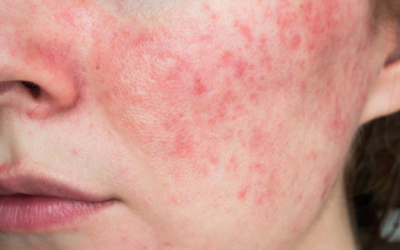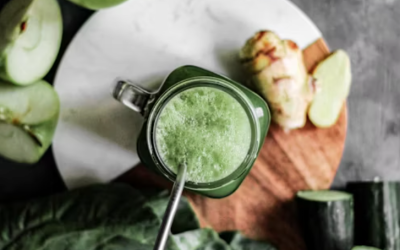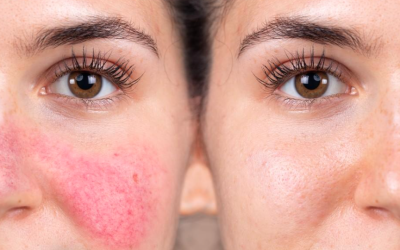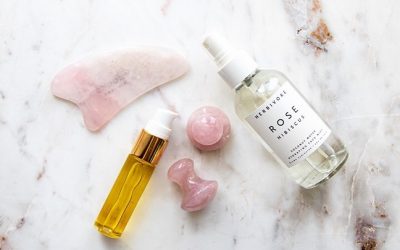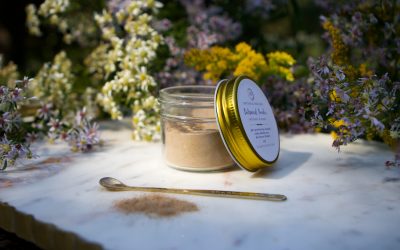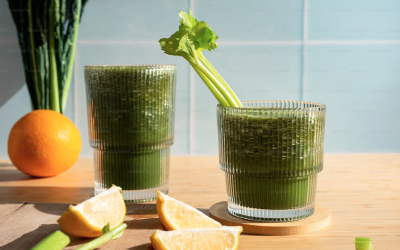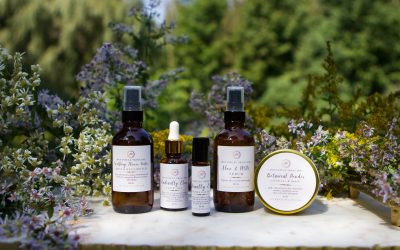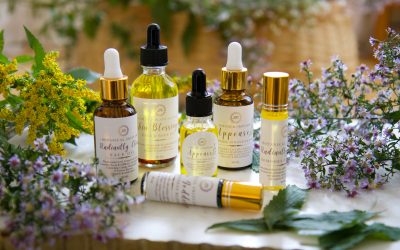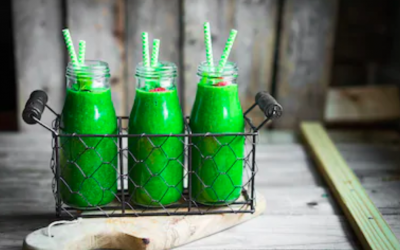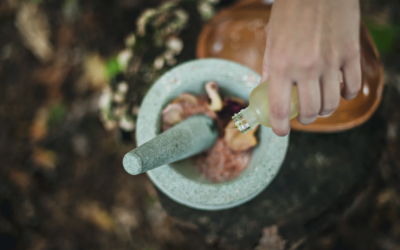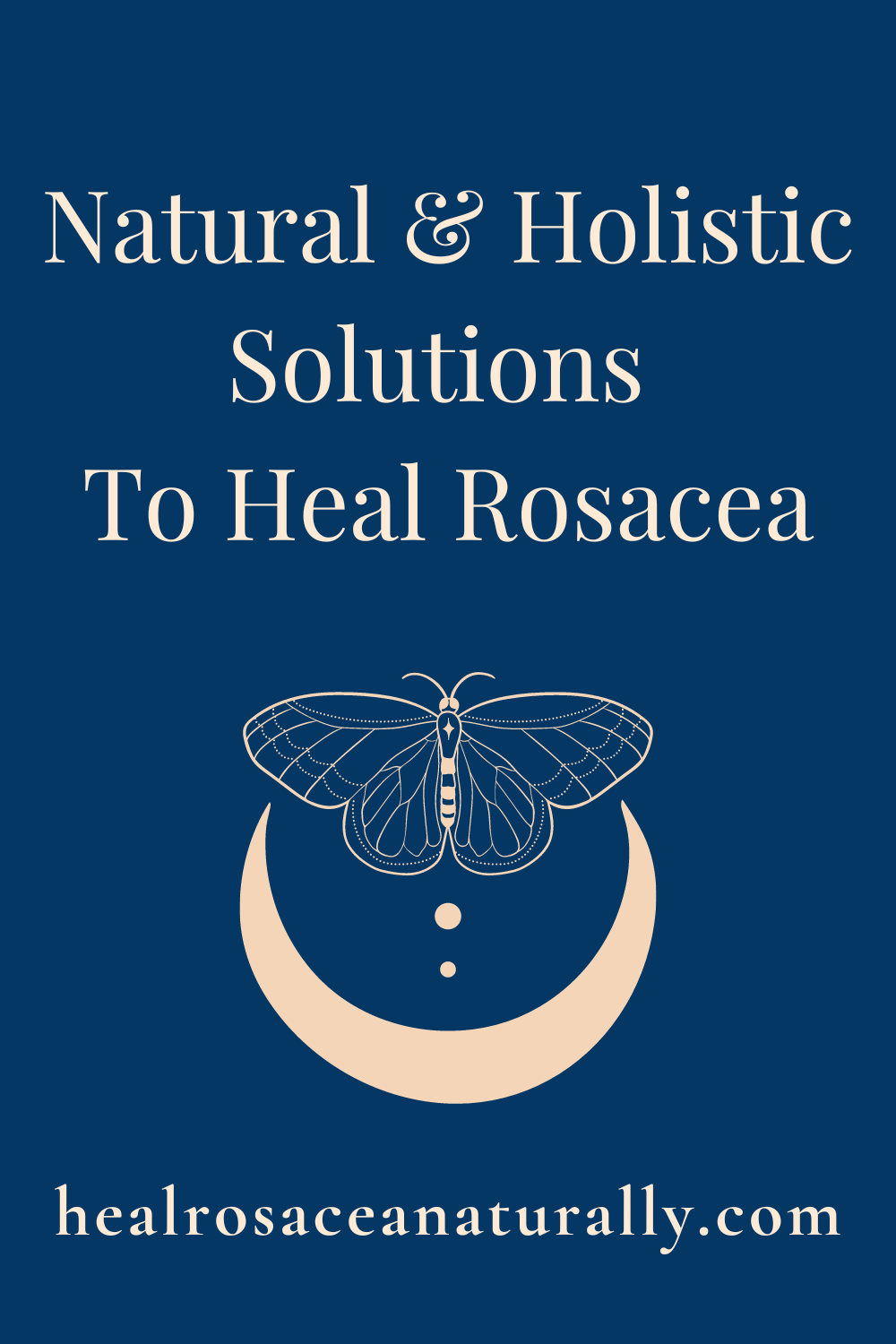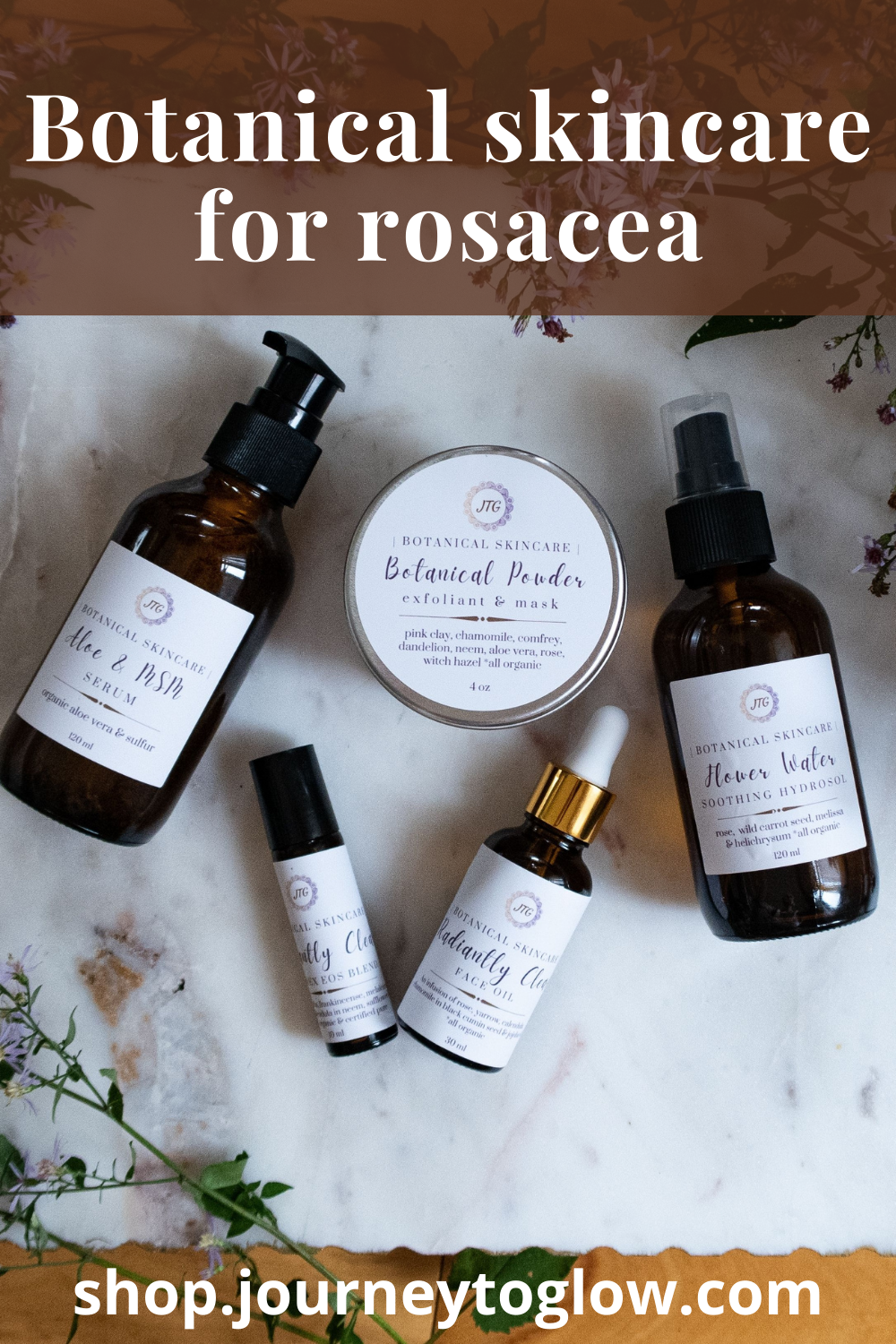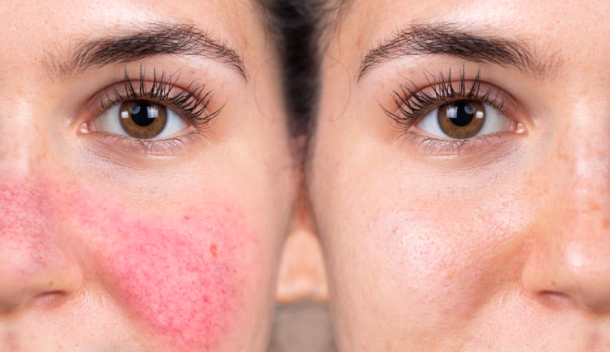The Link Between SIBO & Rosacea written by Sara Kahn, MS, CNS, CDN

Radiantly Clear Rosacea & Demodex Skincare System
I created my own line of botanical skincare because I couldn't find anything on the market that met my standards for clean beauty AND addressed the needs of sensitive, rosacea skin.
The Radiantly Clear Rosacea / Demodex Botanical Skincare System contains 5 products, each formulated with pure plant botanicals that support the healing of inflamed rosacea skin while making the skin's microbiome unfavorable to Demodex mites and breakouts.
The Link Between SIBO and Rosacea
Guest post by Sara Kahn, MS, CNS, CDN
Clinical Nutritionist & Founder of Belly Bliss Nutrition
1. What are the underlying causes of SIBO?
SIBO is essentially a symptom of digestive dysfunction that has resulted in the slow motility of the small intestine. Normally, it should move food and bacteria down and out towards the large intestine. With SIBO, the motility has slowed allowing our good gut bacteria to overgrow.
The key to resolving SIBO is determining and addressing the root cause or the underlying reason for the slow motility. Some of the more common causes we see in our practice include:
• Food poisoning or traveler’s diarrhea. The bacteria that cause these types of stomach upset can lead to an autoimmune response from the body attacking cells that are involved in the motility in the small intestine.
• Hypothyroidism or slow thyroid function can cause slow motility.
• Adhesions caused by abdominal surgery such as c-section, hysterectomy, gall bladder removal, appendectomy, and more. Abdominal surgeries can create scar tissue that can cause narrowing of the intestines.
• Chronic stress can cause SIBO in numerous ways. Chronic stress can lower stomach acid, which is one of our defense mechanisms against bacteria entering the body through the mouth. We need stomach acid to activate enzymes, which help digest food and also help kill bacteria. Stress also produces a hormone called cortisol. Too much cortisol can lead to intestinal inflammation, which can cause slow motility in the small intestine.
Altogether, this can create a perfect storm setting one up for SIBO.
2. Why would someone with rosacea consider looking at SIBO for the possible root cause?
Rosacea is associated with various GI disorders in addition to SIBO such as Inflammatory Bowel Disease, Celiac disease H. pylori infection, and more. If you have symptoms of SIBO such as bloating, gas, constipation, and/or diarrhea then a SIBO breath test may help determine if this is contributing to rosacea.
3. Is it possible to have SIBO but not have symptoms?
A practitioner well-versed in SIBO understands that the test results need to be interpreted in the context of symptoms. In the medical literature, there are healthy controls, who based on test results, would be diagnosed with SIBO but were not experiencing digestive symptoms. They would not be diagnosed with SIBO because they don’t have symptoms.
Because we specialize in digestive health, all of our clients have GI symptoms. So if it’s not SIBO then we keep digging.
4. Any recent research you’ve found helpful on SIBO and rosacea?
A January 2021 systematic review entitled Rosacea, Germs, and Bowels: A Review on Gastrointestinal Comorbidities and Gut–Skin Axis of Rosacea by Wang and Chi (2021) nicely summarizes the current theories on how various gastrointestinal conditions, including SIBO, are related to rosacea.
Wang, F.-Y., & Chi, C.-C. (2021). Rosacea, Germs, and Bowels: A Review on Gastrointestinal Comorbidities and Gut–Skin Axis of Rosacea. Advances in Therapy, 38(3), 1415–1424. https://doi.org/10.1007/s12325-021-01624-x
5. A question we get a lot is: “How does SIBO actually affect the skin, specifically rosacea?” It is difficult to understand how gut dysbiosis is mirrored on the surface of the skin as localized redness/inflammation.
One thing people may not realize is that up to 70% of our immune system cells reside in our gut. Our gut microbiome (the collection of bacteria in the colon) plays a huge role in modulating our immune system. So when we have dysbiosis and our gut is inflamed, this can cause increased inflammation in areas besides the gut and can manifest in symptoms across the whole body. Further, gut inflammation can result in increased intestinal permeability (otherwise known as “leaky gut”). This means bacteria, toxins and allergens can escape into the bloodstream and cause trouble elsewhere. We have many clients who have GI issues also have eczema, psoriasis, hives, rashes, and rosacea.
6. We know that to treat SIBO we can go with herbal anti-microbials or antibiotics, how does one choose?
There is no right or wrong but rather it’s about finding a treatment that works. We have seen antibiotics work well and we have seen herbal antimicrobials work well. We have also seen both approaches not work well. Xifaxan (Rifaximin is the brand name) stays local to the small intestine and doesn’t affect the good gut bacteria in the colon. However, methane dominant SIBO requires the use of Xifaxan plus either metronidazole or neomycin. These antibiotics do have an effect on other bacterial populations such as the colon, vagina, etc. All antibiotics have benefits and risks associated with them along with the potential for side effects.
Herbal antimicrobials may have a halo effect because they are natural but they are not benign. For those with environmental allergies, or for those on certain medications, herbal antimicrobials may not be appropriate. Further, they don’t stay local to the small intestine so there is a risk of causing further dysbiosis in the colon. One of the benefits is that they can be used in small doses with increasing doses to tolerance. This may be better tolerated in those who are sensitive to the powerful effects of antibiotics.
Keep in mind, that antibiotic or herbal antimicrobial treatment is just one piece of the puzzle. We still need to address slow motility and the underlying root causes to clear SIBO and prevent it from returning.
7. How do we pinpoint the root cause of SIBO, what are the underlying causes, and do we treat the root cause of SIBO first or the bacterial overgrowth?
Identifying the cause of slow motility of the small intestine is the key to resolving SIBO. If we are able to work with our clients before SIBO treatment, we prefer to improve digestive function as much as possible first before their SIBO treatment.
This may mean naturally increasing stomach acid and enzyme production, chewing food thoroughly to make digestion easier, eating in a calm environment, reducing stress, having regular bowel movements, and improving motility of the small intestine. We find when we are able to do this work first, not only do our clients feel better but it makes clearing SIBO and tolerating SIBO treatment much easier.
8. Once SIBO is addressed, how quickly does it reflect on our skin?
Every client has a different experience. We are often not just addressing SIBO but also histamine intolerance, allergies, food sensitivities, leaky gut, nutrient deficiencies, etc. Some clients see improvements in their skin even before SIBO is treated because we are determining triggers and improving digestive function. And for others, their journey is longer. Just like with fitness, if you stop exercising, you’ll be less fit. Same with gut health. Gut health needs constantly evolve and there are always opportunities to make sure our digestive system works optimally.
Wanna learn more about healing rosacea naturally and holistically? Dive into our podcast interviews with holistic skin experts.

Sara Kahn, MS, CNS, CDN is a board-certified clinical & functional nutritionist in New York City and as the founder of Belly Bliss Nutrition works virtually with clients all over the country.
Like most of her clients, she struggled with digestive issues for years as well as anemia, nutrient deficiencies, and skin conditions. It wasn’t until she understood the root cause of her symptoms that she started healing.
To learn more about Sara’s work and her program Solving SIBO visit sarakahnnutrition.com/solving-sibo
Journey To Glow readers can save $50 off the pay in full price using code SIBOGLOW.
Functional Nutrition & Herbal Medicine For Rosacea
As a Functional Nutrition Practitioner, Skin Herbalist, Certified Advanced Transformative Coach, and someone who’s personally been on a rosacea healing journey, I’m equipped to work with clients in a unique capacity.
My approach – which is personalized and designed to support each of my clients’ bio-individuality – enables me to get to the root cause(s) that brings about skin inflammation.
Once we’ve pinpointed the possible root causes (emotional, physical, or environmental), we work to support the body back into balance, so it can heal itself.
The result? Clear, glowing skin.
Podcast & Glow Blog
The Effects of Demodex Mites on Rosacea: Natural Solutions and Botanical Skincare Recommendations
In this blog post, we'll dive into how these tiny mites affect rosacea and share some natural solutions and botanical skincare tips that will help restore your skin barrier integrity. What is rosacea? Rosacea is a skin imbalance that causes redness, visible blood...
Detox Your Liver to Heal Rosacea
Detox Your Liver to Heal Rosacea Rosacea can be a real hassle—redness, visible blood vessels, and sometimes even red, pus-filled bumps on your face. While there's no magic cure, detoxing your liver is a crucial holistic component to healing rosacea. Let's dive into...
How Alkalinity Could Be the Key to Healing Rosacea
Alkalinity As The Key to Healing Rosacea If you’re struggling with rosacea and dreaming of clear, glowing skin, you’ve probably tried all sorts of remedies. One idea that’s getting a lot of buzz is the importance of keeping your body alkaline. In this post, we'll...
Gua Sha For Rosacea & Clear Glowing Skin
Gua Sha For Rosacea & Glowing SkinUPDATED May 2024 The Gua Sha has recently exploded in the beauty market, so I wanted to share a few thoughts and resources. First, I want to stress the importance of investing in a high-quality tool bought from a trusted company....
How Nervous System Regulation Can Help You Heal
Did you know that addressing the mind-body connection through nervous system regulation and limbic system retraining can make a world of difference when it comes to reversing chronic conditions? Intuitively, this has always made sense to me. But up until recently, I...
Videos: How To Use The Radiantly Clear Rosacea Skincare System
The Radiantly Clear Rosacea Skincare System contains 5 products which can be used in 5 simple steps. Once you're familiar with the products and how they feel on your skin, adjust based on your needs which will change with the season. In the coming weeks and months,...
Unveiling the Enigma: Exploring the Root Causes of Rosacea
Exploring the Root Causes of Rosacea In this blog post, we'll explore the root causes of rosacea and the underlying factors that may contribute to its development. Please note that this is not a deep dive but an overview. Rosacea is characterized by redness, visible...
The Green Elixir: Unlocking the Benefits of Celery Juice for Rosacea
Unlocking the Benefits of Celery Juice for Rosacea Rosacea, a chronic (but not incurable) skin condition characterized by redness, inflammation, and visible blood vessels, can be a source of discomfort and self-consciousness for many individuals. While there is no...
How To Use The Rosacea Demodex Skincare System
*Please see the rosacea skincare videos at the bottom of this page. I launched my own botanical skincare line a few years ago after struggling to find safe and effective skincare products for rosacea and Demodex mites. You can learn more about the "why" behind my...
Natural Skincare for Rosacea
Which natural skincare is best for rosacea?UPDATED October 1st 2023 This post aims to shed light on the best natural skincare for rosacea and give you some pointers to help you shop smarter. As someone who has done extensive research on rosacea skincare and healing...
My 30-Day Medical Medium Celery Juice Challenge & Resulting Skin Crisis
My 30-Day Medical Medium Celery Juice Challenge (And Resulting Skin Crisis)First written in Jan 2018 UPDATED January 2024 I initially wrote this post almost 5 years ago, and a lot has changed since then. I'm now a certified Functional Nutrition Practitioner and Skin...
Demodex mites rosacea natural treatment
Natural Treatment For Demodex Mites & RosaceaLAUNCHES SUMMER 2024 CLEARTaught by Functional Nutrition Practitioner & Skin Herbalist Caroline Dalia Kaliani, CLEAR is a one-of-a-kind online + group coaching program for committed and empowered women who want to...



